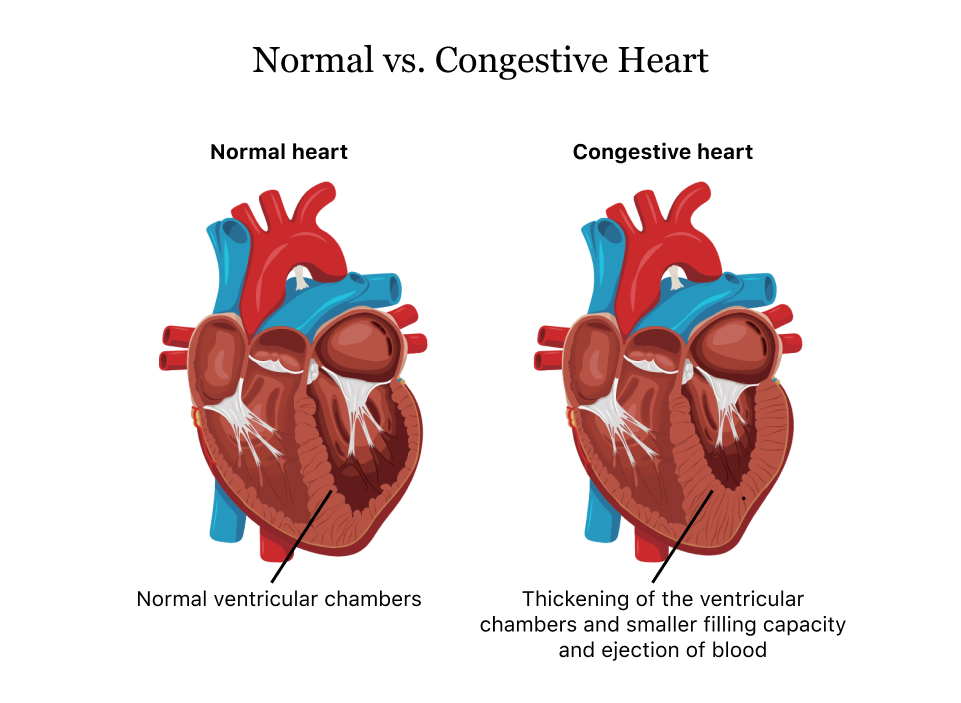What is Heart Failure Management?
Heart failure management encompasses the diagnosis, treatment, and ongoing care of patients with heart failure, a condition where the heart cannot pump blood efficiently to meet the body’s needs.
The primary goals of heart failure management are:
- Alleviating symptoms like breathlessness and fatigue
- Preventing disease progression
- Reducing hospitalizations
- Enhancing the patient’s quality of life
Depending on the stage of heart failure (mild, moderate, or severe), management may involve a combination of lifestyle changes, medications, medical devices, and surgeries. Advanced therapies like LVAD implantation or heart transplants are recommended in cases of end-stage heart failure.
Causes of Heart Failure
Heart failure is often the result of underlying conditions that damage or overwork the heart. Common causes include:
- Coronary Artery Disease (CAD): Blockages in heart arteries reduce blood supply to the heart muscle.
- Hypertension (High Blood Pressure): Increases the heart’s workload, leading to muscle thickening and eventual failure.
- Heart Attack: Damages a portion of the heart muscle, weakening its pumping ability.
- Cardiomyopathy: Diseases of the heart muscle, such as dilated or hypertrophic cardiomyopathy.
- Valvular Heart Disease: Improperly functioning heart valves force the heart to work harder.
- Diabetes: Affects blood vessels and contributes to heart damage.
- Arrhythmias: Irregular heart rhythms that impair blood circulation.
Symptoms of Heart Failure
The symptoms of heart failure can range from mild to severe and may vary depending on whether the failure affects the left, right, or both sides of the heart. Common symptoms include:
- Shortness of breath (dyspnea), especially during exertion or lying down
- Fatigue or weakness
- Swelling (edema) in the legs, ankles, and feet
- Rapid or irregular heartbeat (palpitations)
- Persistent cough or wheezing, sometimes with blood-tinged sputum
- Difficulty concentrating or confusion
- Sudden weight gain due to fluid retention
It is essential to seek medical attention if these symptoms occur, as early diagnosis and management can significantly improve outcomes.
Types of Heart Failure Treatments
- Medications:
- Diuretics: Help reduce fluid buildup and swelling.
- Beta-Blockers: Decrease the heart rate and improve heart function over time.
- ACE Inhibitors/ARBs: Lower blood pressure and reduce strain on the heart.
- Aldosterone Antagonists: Prevent fluid retention and further damage to the heart.
- Inotropes: Improve heart muscle contractions in severe cases.
- Medical Devices:
- Implantable Cardioverter Defibrillator (ICD): Monitors and corrects dangerous heart rhythms.
- Cardiac Resynchronization Therapy (CRT): Uses a special pacemaker to coordinate the heart’s contractions.
- Left Ventricular Assist Device (LVAD): A mechanical pump implanted to help the heart circulate blood.
- Surgical Interventions:
- Coronary Artery Bypass Grafting (CABG): Improves blood flow to the heart muscle by bypassing blocked arteries.
- Valve Repair or Replacement: Corrects damaged or defective heart valves.
- Heart Transplant: For end-stage heart failure, where other treatments are no longer effective.
- Lifestyle Modifications:
- Following a low-sodium diet
- Engaging in moderate, regular physical activity
- Quitting smoking and reducing alcohol consumption
- Stress management techniques
Advanced Therapies for Heart Failure
- LVAD (Left Ventricular Assist Device):
- An LVAD is a mechanical pump implanted in the chest to assist the failing left ventricle.
- It is used as a bridge-to-transplant for patients awaiting a heart transplant or as destination therapy for those not eligible for a transplant.
- Cost in India is significantly lower compared to Western countries, ranging from $20,000–$25,000 USD.
- Heart Transplant:
- The ultimate solution for patients with end-stage heart failure.
- India’s experienced surgeons, advanced post-operative care, and affordable costs make it an ideal destination for heart transplants.
- Stem Cell Therapy:
- An emerging treatment that involves using the patient’s stem cells to repair damaged heart tissue.
Benefits of Heart Failure Management
- Symptom Relief: Patients experience a reduction in symptoms like breathlessness and fatigue.
- Improved Longevity: Timely interventions can extend life expectancy.
- Better Quality of Life: Proper management allows patients to lead more active and fulfilling lives.
- Fewer Hospitalizations: Proactive care reduces the need for frequent hospital visits.
- Prevention of Complications: Effective management minimizes the risk of stroke, kidney damage, and other complications.
Recovery After Heart Failure Treatment
- Hospital Stay:
- Depending on the treatment, hospital stays can range from 2-7 days for medication adjustments or device implantations.
- Heart transplant patients may require longer stays for recovery and monitoring.
- Post-Treatment Care:
- Regular follow-ups are critical to monitor heart function, adjust medications, and evaluate device performance.
- Patients are enrolled in cardiac rehabilitation programs to improve physical fitness and emotional well-being.
- Lifestyle Changes:
- A heart-healthy lifestyle is essential for long-term recovery.
- This includes dietary changes, regular exercise, and stress management practices.
- Full Recovery Timeline:
- Recovery time varies based on the treatment; patients with device implants may resume normal activities within weeks, while heart transplant recipients may take 6-12 months for full recovery.
Why Choose India for Heart Failure Management?
India is a global leader in heart failure management, offering:
- World-Class Facilities: Top hospitals equipped with cutting-edge technology for advanced cardiac care.
- Experienced Specialists: India boasts a pool of highly skilled cardiologists and cardiac surgeons with years of experience.
- Affordable Treatment Costs: Heart failure management in India is significantly more economical than in Western countries.
- Comprehensive Care: Hospitals in India offer holistic care, including diagnostics, treatments, and post-operative support.
- Medical Tourism Packages: Tailored packages include treatment, accommodation, and travel arrangements for international patients.
Why Choose Healtour Solutions for Heart Failure Management?
At Healtour Solutions, we are dedicated to connecting patients with India’s top hospitals and specialists for heart failure management.
- Customized Care: We match patients with hospitals and treatments that meet their unique needs.
- Transparent Pricing: Our cost-effective packages provide the best value without compromising quality.
- 24/7 Support: Our team assists patients throughout their medical journey, from consultation to post-treatment care.
- Seamless Process: From visa assistance to travel arrangements, we handle everything for a hassle-free experience.
FAQs About Heart Failure Management
1. What is heart failure?
Heart failure occurs when the heart is unable to pump enough blood to meet the body’s needs. It can happen when the heart muscle becomes too weak or stiff, preventing it from functioning properly. This condition can affect one or both sides of the heart.
2. What are the main causes of heart failure?
The most common causes of heart failure include:
- Coronary artery disease
- High blood pressure (hypertension)
- Heart attacks
- Cardiomyopathy (weakened heart muscle)
- Valvular heart diseases
- Diabetes
- Arrhythmias (irregular heartbeats)
3. What are the symptoms of heart failure?
Symptoms of heart failure include:
- Shortness of breath (especially when lying down or with exertion)
- Fatigue and weakness
- Swelling in the legs, ankles, or abdomen
- Rapid or irregular heartbeat
- Persistent coughing or wheezing
- Difficulty concentrating or confusion
- Weight gain due to fluid retention
4. How is heart failure diagnosed?
Heart failure is diagnosed through a combination of:
- Physical examination
- Medical history review
- Blood tests (to assess kidney and heart function)
- Electrocardiogram (ECG)
- Echocardiogram (to visualize heart function)
- Chest X-ray
- MRI or CT scans for more detailed images of the heart
5. What treatment options are available for heart failure?
Treatment options for heart failure include:
- Medications: such as diuretics, ACE inhibitors, beta-blockers, and aldosterone antagonists.
- Medical devices: like pacemakers, ICDs (Implantable Cardioverter Defibrillators), and CRT (Cardiac Resynchronization Therapy).
- Surgical procedures: such as heart valve repair/replacement, coronary artery bypass surgery (CABG), and heart transplant.
- Lifestyle changes: including dietary modifications, exercise, and stress management.
6. Can heart failure be prevented?
While not all cases of heart failure can be prevented, certain risk factors can be controlled to reduce the likelihood of developing the condition:
- Managing high blood pressure
- Avoiding smoking
- Maintaining a healthy diet
- Regular physical activity
- Managing diabetes and cholesterol levels
- Limiting alcohol intake
7. What is the difference between left-sided and right-sided heart failure?
- Left-sided heart failure: Occurs when the left side of the heart cannot pump blood to the body effectively, causing fluid to build up in the lungs (pulmonary congestion).
- Right-sided heart failure: Occurs when the right side of the heart fails to pump blood to the lungs, causing fluid buildup in the legs, abdomen, and other parts of the body (peripheral edema).
Both conditions can occur together, which is known as congestive heart failure.
8. What are the advanced treatment options for heart failure?
Advanced treatments for severe heart failure include:
- Left Ventricular Assist Devices (LVADs): Mechanical pumps that assist the left ventricle in circulating blood.
- Heart transplant: A surgical procedure where a severely damaged heart is replaced with a healthy donor heart.
- Stem cell therapy: An emerging treatment aimed at repairing heart muscle using stem cells.
- Gene therapy: Experimental treatments that may help regenerate heart tissue or improve heart function.
9. How long can a person live with heart failure?
The life expectancy of someone with heart failure depends on several factors, including the underlying cause, the severity of the condition, age, response to treatment, and lifestyle changes. With proper management, many individuals can live for several years, sometimes even decades, with a good quality of life.
10. What lifestyle changes are necessary for managing heart failure?
Lifestyle changes are crucial for managing heart failure effectively:
- Diet: A heart-healthy diet low in salt, sugar, and saturated fats.
- Exercise: Regular, moderate physical activity as advised by a doctor.
- Weight management: Maintaining a healthy weight to reduce strain on the heart.
- Stress management: Practicing relaxation techniques like yoga and meditation.
- Medication adherence: Taking prescribed medications as directed and attending regular follow-up appointments.




